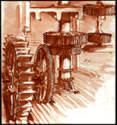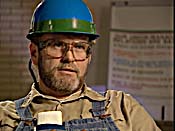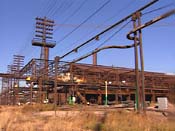In 1993, the United Steelworkers of America began an exciting experiment. Labor- management cooperation made the American steel industry one of the most productive in the world, measured in tons per employee hour. Even so, the staggering burden of pension costs and the failure to cut layers and layers of middle managers put a large segment of the industry into bankruptcy. Even more radical changes were necessary to save the industry as related in Merrimack’s latest film, Rustbelt Phoenix.
Partners relates the first stage of this process. Interviews with the union’s visionary leader, Lynn Williams, and other union leaders, supervisors, and workers tell how the partnership developed from its roots in the union’s early days. We recommend using both titles. Together they show that when a business is failing the remedy is not to give up partnership but rather to give labor more of a voice.
The contrast between Area Committee meetings in the two films is striking. When managers and workers at the giant Sparrows Point, Maryland plant met in 1995, management listened politely to worker complaints and suggestions. Last year, as you’ll see in Rustbelt Phoenix, workers ran the meeting and prevailed in major disagreements, even rebuking managers publicly. That successful partnership was built on the one portrayed in Partners."Your video ... meshes with the findings that my colleagues and I
gathered from numerous plant visits. There are good things happening in
steel manufacturing today. The relationship between management and production
workers is one of the keys to a firm's success, and you capture its importance
very well."
--Frank Giarratani, Chairman, Economics Dept., University of Pittsburgh
"An interesting case study of labor-management relations in transition.
Provides an informative first-hand look at the prospects and challenges
of cooperative programs at the workplace level."
--Professor Daniel G. Gallagher, Dept. of Management, James Madison University
College of Business
"Good movie. Showed some innovative ways for companies and unions
to work together."
--Scott Kusmierczak, Industrial Relations Dept., Union Electric Company,
St. Louis, MO
Merrimack Films
530 Concord Ave.
Belmont, MA 02478
USA
1-617-489-4729
Email: sales@merrimack-films.com





